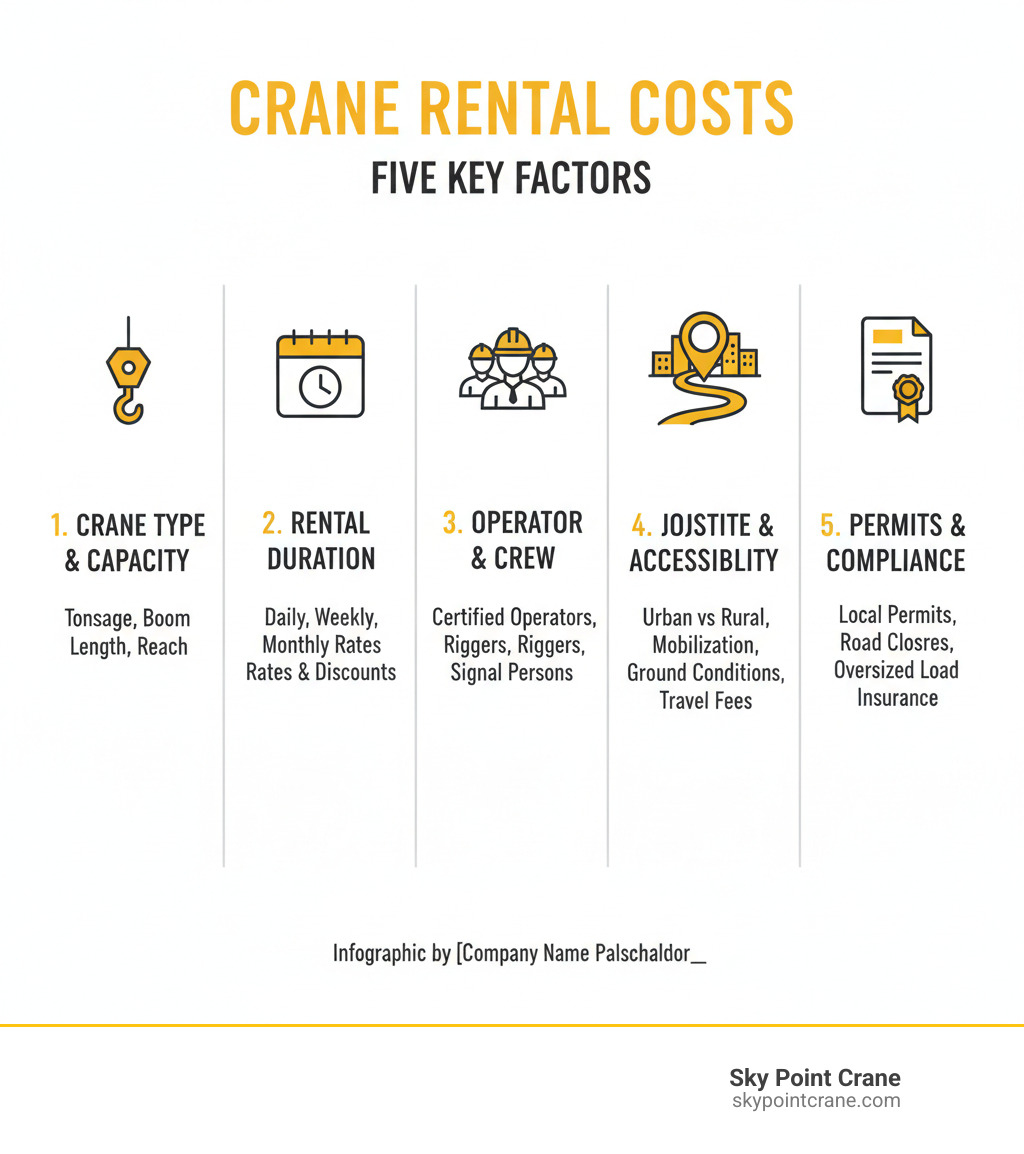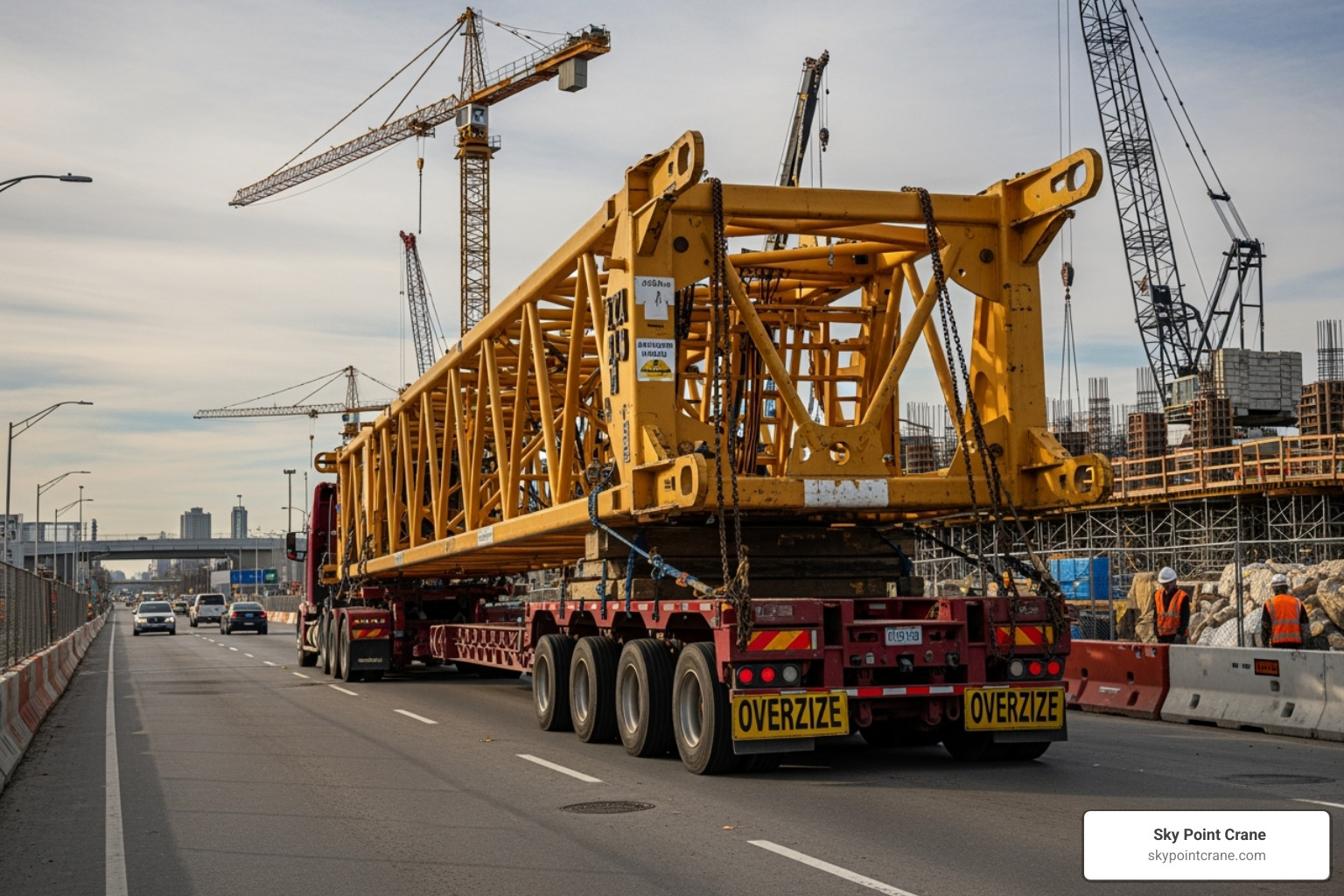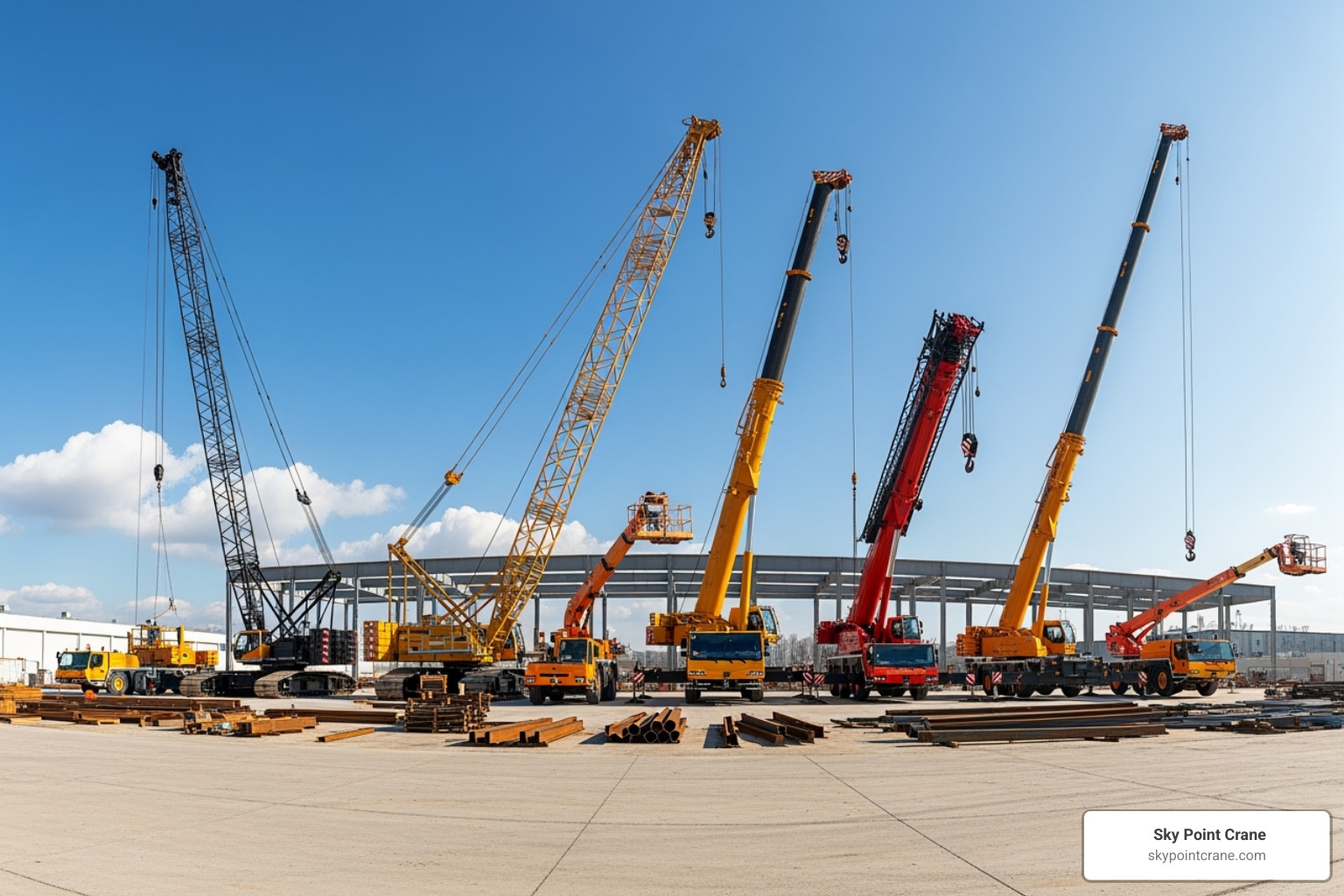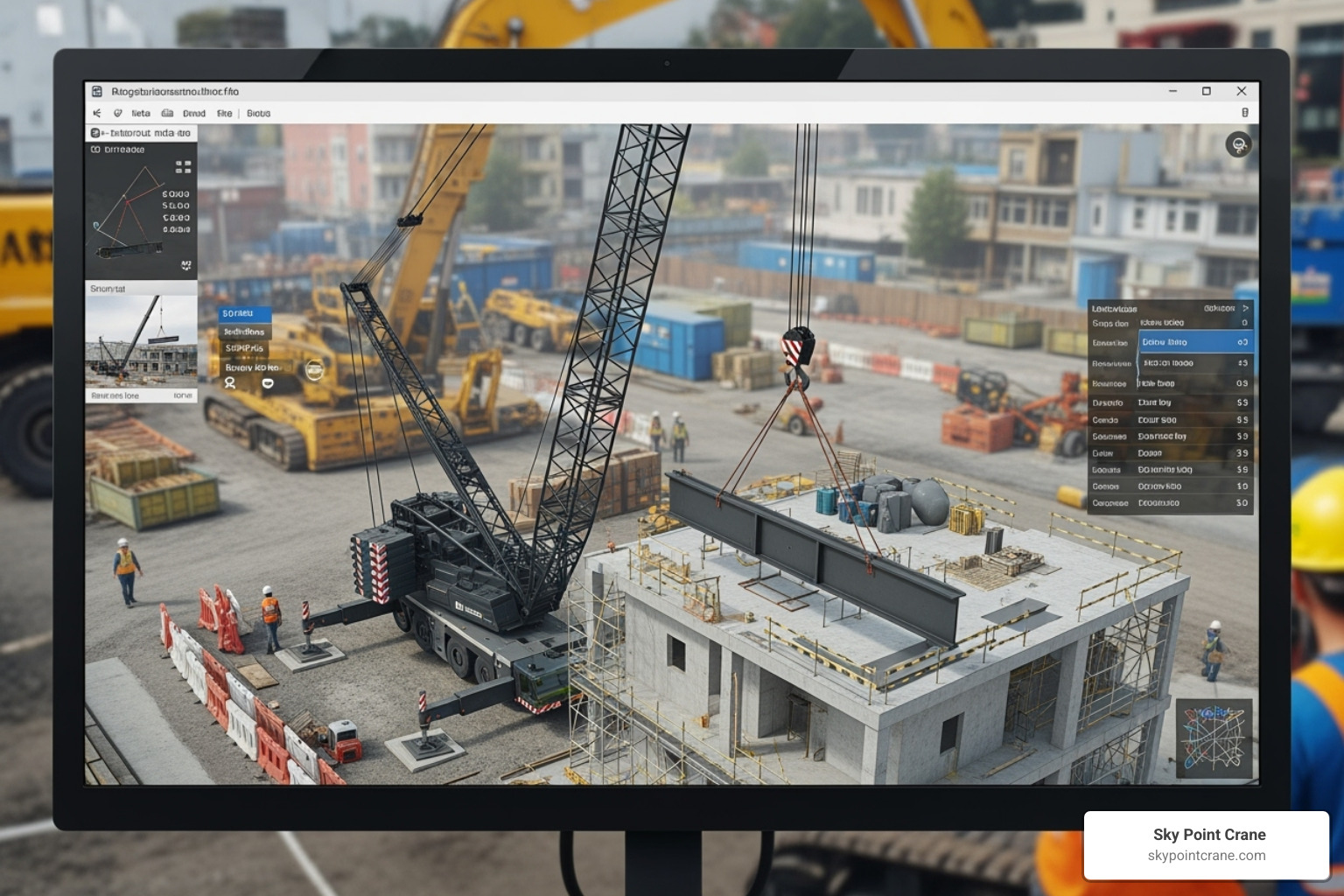Why Understanding Crane Rental Costs Matters for Your Project
Crane rental costs can range from $200 to $1,500 per day for smaller equipment, while large, specialized cranes can reach $15,000+ per month. However, the final price depends on many factors beyond the base rate.
Quick Cost Overview:
- Small mobile cranes: $200-$500 per day
- Operated cranes: $1,000-$2,000 per day
- Tower cranes: Up to $15,000 per month
- Hourly rates with operator: $300-$1,500+ depending on capacity
- Additional costs: Mobilization, permits, operators, fuel, setup/teardown
For any construction or industrial project, understanding what drives crane rental pricing is essential for accurate budgeting and avoiding costly surprises. The final invoice includes more than just the equipment; it reflects the crane type, rental duration, operator needs, jobsite location, and permits.
Projects involving heavy lifting cannot afford delays from inadequate equipment or unexpected fees. Success requires the right crane, certified operators, proper planning, and transparent pricing to keep your project on schedule and within budget.
I’m Dave Brocious, and with over 30 years in the crane and construction industries, I’ve helped countless project managers manage crane rental costs. My experience at Sky Point Crane confirms that understanding the full cost picture upfront is the foundation of every successful lift.

Deconstructing Crane Rental Costs: What’s in the Price Tag?
When people ask about crane rental costs, they often focus on the base rate. However, like an iceberg, a significant portion of the expense lies below the surface. Understanding the full picture—base rates, additional costs, and other fees—is key to confident budgeting. For a deeper financial analysis, see our guide on The Economics of Crane Rentals.

Base Rental Rates: Daily, Weekly, and Monthly
The foundation of your cost is the crane’s rental rate, which varies by equipment type.
- Small mobile cranes for tight spaces or lighter tasks typically cost $200 to $500 per day.
- Operated cranes, which include a certified operator, range from $1,000 to $2,000 per day. The higher rate reflects the operator’s expertise, which ensures safety and efficiency.
- Tower cranes for major, long-term construction can cost up to $15,000 per month or more, as they are assembled on-site for the project’s duration.
A pro tip: weekly or monthly rentals often come with discounted rates compared to daily hires. If your project spans several days, ask about extended rental packages. For quick jobs, consider options like our Rent a Boom Truck for a Day service.
Beyond the Base: Uncovering Additional Expenses
These common expenses are often overlooked in initial budgets. They are not hidden fees but essential components of professional crane work.
- Mobilization and Transportation: Covers transporting the crane to and from your jobsite. Costs depend on crane size, travel distance, and whether special permits or escorts are needed.
- Setup and Teardown: The labor required to assemble and disassemble the crane. This can range from a quick process for small cranes to hours of work for large tower or crawler cranes.
- Operator Fees: Included with operated rentals, covering an NCCCO certified professional. For bare rentals, you must budget for your own operator’s wages and benefits.
- Riggers and Signal Persons: These essential crew members ensure loads are secured and balanced correctly and guide the operator. They typically cost $60 to $100 per hour each. We provide trained Rigging & Signal Persons to ensure safety.
- Fuel Surcharges: Cranes consume significant fuel. This cost is often passed on as a surcharge or is the renter’s direct responsibility.
- Permit Fees: Costs for local, road closure, or oversized load permits vary widely, from a few hundred to several thousand dollars, depending on the project’s location and complexity.
- Insurance: While we carry comprehensive insurance, your project may require specific additional coverage. Always confirm insurance details beforehand.
- Overtime and Holiday Rates: Work outside standard 8-hour days or on holidays typically incurs premium rates (often time-and-a-half).
- Specialized Equipment: Attachments like man baskets, spreader bars, or extra jibs are usually rented separately.
Key Factors That Drive Your Rental Price
Your final invoice is shaped by the crane’s specifications, your project’s demands, and logistical challenges. Understanding these key factors helps clarify what you’re paying for.

Crane Type and Capacity: Matching the Machine to the Mission
The single biggest factor in your crane rental costs is the crane itself. Larger, more capable cranes cost more to rent, transport, and operate.
- Lifting Capacity (Tonnage): A 100-ton crane is inherently more expensive than a 40-ton crane due to its size and engineering.
- Boom Length and Reach: Cranes that can lift loads higher or farther require more complex machinery, increasing the cost.
Different crane types are priced according to their capabilities:
- Rough Terrain Cranes: Ideal for off-road sites, these may run $300 to $600 per day.
- All-Terrain Cranes: Versatile for both highway travel and rough jobsites, larger models can exceed $2,000 per day.
- Crawler Cranes: Mounted on tracks for stability on soft ground, these heavy-lifters often cost over $2,000 per day plus significant setup fees.
- Tower Cranes: Used for high-rise construction, these are rented monthly, with costs reaching $15,000 per month.
Choosing the right size is crucial for both budget and safety. Over-specifying wastes money, while under-specifying is dangerous. We offer everything from Mini Crane Rental for tight spaces to Heavy Duty Crane Rental for maximum power.
Bare vs. Operated Rentals: What’s the Difference in Cost?
This choice significantly impacts your budget and responsibilities.
- A bare rental includes only the crane. You are responsible for providing a certified operator, crew, fuel, maintenance, and insurance. While the base rate is lower, the total cost and liability are higher. This option suits companies with in-house crane teams.
- An operated and maintained (O&M) rental is a turnkey solution. We provide the crane, a NCCCO certified operator, maintenance, and insurance. This simplifies logistics and ensures safety, often providing better overall value. At Sky Point Crane, we focus on O&M rentals to deliver a complete, expert solution. For more context on industry pricing, you can consult resources like How Much Does a Crane Rental Cost?.
Jobsite Location and Accessibility
Your project’s location and accessibility directly influence crane rental costs.
- Urban vs. Rural Sites: Urban jobs in areas like Pittsburgh may require costly traffic control and permits, while rural sites may have higher transportation costs due to longer travel distances and challenging access roads.
- Site Accessibility: We assess gate widths, overhead power lines, road weight limits, and ground conditions. Poor access may require smaller cranes or ground stabilization, affecting the cost.
- Mobilization Distance: The farther your site is from our yards in Pennsylvania, Ohio, West Virginia, or Maryland, the higher the transportation fees. Our experience with Crane Rental Pittsburgh projects means we steer these factors efficiently.
Rent vs. Buy: Making the Smart Financial Decision
For most businesses, renting a crane is more financially sound than buying one. The total cost of ownership often outweighs the perceived savings.
The initial capital investment for a crane is staggering, running from hundreds of thousands to over a million dollars. This capital is tied up in a single asset that also depreciates steadily over time.
Beyond the purchase price, ownership includes relentless costs:
- Maintenance: Routine inspections, scheduled service, and unexpected repairs require certified technicians and specialized parts.
- Storage: Secure yard space is necessary, adding a significant and continuous expense.
- Staffing: You need to hire, train, and certify your own operators and crew.
Here’s where renting provides a clear advantage:
- Flexibility: Renting allows you to select the perfect crane for each specific job, from a compact boom truck to a large all-terrain model. You only pay for what you need, when you need it.
- Access to Modern Technology: The crane industry is always advancing. Renting gives you access to a modern, well-maintained fleet with the latest safety and efficiency features, without the cost of upgrading.
While ownership may suit companies with constant, predictable lifting needs, most find that renting is a smarter allocation of resources. Our article on Truck Crane Rental vs Purchase: Which is the Best Option for Your Business? offers a more detailed financial breakdown. Renting lets you focus on your core business while we manage the complexities of crane ownership.
How to Optimize Your Crane Rental Budget
Knowing the components of crane rental costs is the first step; optimizing your budget is the next. Strategic planning can save thousands of dollars without compromising safety.

Planning and Preparation for Lower Crane Rental Costs
The time you invest in planning directly translates to savings. Follow these key strategies:
- Schedule in Advance: Booking your crane weeks or months ahead secures availability and often locks in better rates than last-minute rentals.
- Right-Size the Crane: Work with our experts to match the crane to your lift’s specific weight, height, and reach requirements. Using the correct size avoids paying for unnecessary capacity or creating unsafe conditions.
- Optimize On-Site Operations: Prepare the jobsite before the crane arrives. Have loads staged, consolidate multiple lifts into a single mobilization, and ensure clear access to minimize costly idle time.
- Bundle Services: Ask about package deals that combine the crane, operator, crew, and transportation. Bundling is often more cost-effective and simplifies logistics.
- Understand Contract Terms: Review your rental agreement for details on minimum rental periods, overtime rates, fuel surcharges, and weather delay policies to avoid surprises.
One of our most powerful planning tools is 3D Lift Planning. This technology creates a virtual simulation of the lift, allowing us to optimize crane placement, identify obstacles, and confirm that we are using the most efficient and economical equipment for the job.
Understanding Value-Added Services
The cheapest quote isn’t always the best value. Comprehensive services can prevent costly mistakes and delays, saving you more in the long run.
- Project Management: Our dedicated project managers coordinate logistics, manage timelines, and solve problems, keeping your project on track and on budget.
- Engineering Services: Our team performs critical calculations for load weights, ground pressure, and custom rigging designs to ensure every lift is optimized for safety and efficiency.
- Heavy Haul Logistics: Integrating transportation with crane services streamlines the project, eliminating coordination gaps between multiple vendors.
- Turnkey Solutions: We can handle everything from planning and crane selection to operation and demobilization. This frees your team to focus on their core tasks while we manage all lifting operations.
These services improve safety and efficiency, which are the true drivers of cost control. Our Commercial Crane Rental services integrate these solutions into a seamless package, focusing on total project value, not just the rental price.
Frequently Asked Questions about Crane Rental Pricing
Here are straightforward answers to the most common questions we receive about crane rental costs.
What is a typical hourly rate for a crane with an operator?
The rate depends entirely on the crane’s size and capacity.
- Smaller hydraulic cranes (14-30 ton): Typically $100 to $200 per hour.
- Larger heavy-duty cranes (50-100+ ton): Rates can range from $300 to $1,000 or more per hour.
Most rentals have a minimum period, often 4 hours, to cover mobilization and setup. Also, plan for overtime rates (usually 1.5x the standard rate) for work beyond an 8-hour day or on weekends and holidays.
What permits are needed and what do they cost?
Permit requirements and costs vary significantly by location and project scope. Common permits include:
- Local City/Municipal Permits: For operating within a jurisdiction.
- Road Closure Permits: Needed if the crane or operation obstructs traffic.
- Oversized Load Permits: Required for transporting large cranes to the jobsite.
Costs can range from a few hundred dollars for a simple permit to several thousand dollars for complex urban projects requiring traffic control and escorts. We have extensive experience navigating these requirements across Pennsylvania, Ohio, West Virginia, and Maryland and can manage the permitting process for you.
Are operator and crew costs included in the rental price?
This depends on the type of rental agreement.
- An operated rental, which is our specialty at Sky Point Crane, includes the cost of the NCCCO certified crane operator in the quoted rate.
- A bare rental only includes the machine. You are responsible for hiring and paying for your own certified operator and crew.
Even with an operated rental, the costs for riggers and signal persons are typically billed separately. These essential safety personnel usually cost $60 to $100 per hour per person. We provide highly trained Rigging & Signal Persons to ensure every lift is safe and efficient. Always ask for a detailed quote that clarifies all included and separate costs to avoid surprises.
Conclusion: Partnering for a Successful and Cost-Effective Lift
Understanding crane rental costs requires looking beyond the base rate to the full scope of expenses, from mobilization to crew and permits. The key to a successful project is not just finding the lowest price, but the best value—a balance of cost, safety, and efficiency achieved through thorough planning.
Safety is non-negotiable. Working with NCCCO certified operators and experienced crews minimizes risk and prevents costly accidents or delays. This commitment to safety is the foundation of a cost-effective lift.
At Sky Point Crane, we are more than a rental company; we are your lifting partner. We provide comprehensive solutions across Western and Central Pennsylvania, Ohio, West Virginia, and Maryland. Our services, including 24/7 availability and advanced 3D Lift Planning, are designed to deliver value and ensure your project’s success.
We believe in building partnerships by understanding your needs and budget to craft a solution that keeps your project on schedule and your crew safe. Let us lift your expectations.
Ready to discuss your project? Explore Crane Rental Services and find how Sky Point Crane can help you achieve a successful, cost-effective lift.
